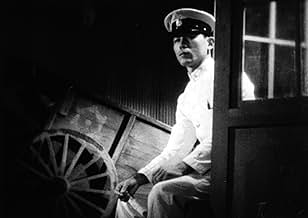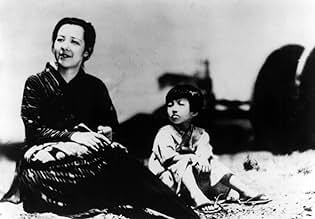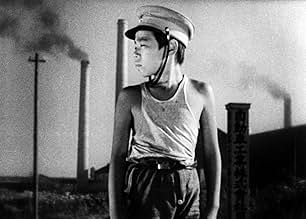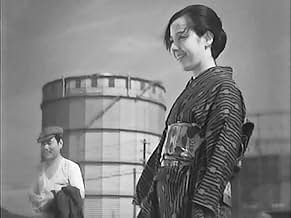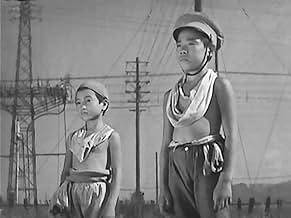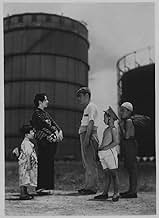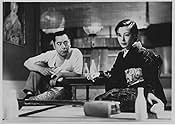Tôkyô no yado
- 1935
- 1 घं 19 मि
IMDb रेटिंग
7.4/10
1.8 हज़ार
आपकी रेटिंग
अपनी भाषा में प्लॉट जोड़ेंUnemployed Kihachi and his two sons struggle to make ends meet. But that doesn't keep Kihachi from wooing single mother Otaka.Unemployed Kihachi and his two sons struggle to make ends meet. But that doesn't keep Kihachi from wooing single mother Otaka.Unemployed Kihachi and his two sons struggle to make ends meet. But that doesn't keep Kihachi from wooing single mother Otaka.
- निर्देशक
- लेखक
- स्टार
फ़ीचर्ड समीक्षाएं
This film deals with an unemployed man and his two sons who rover through the industrial areas of Tokyo during the depression in the search for work.
After some bad luck the father is able to find a job but then the pity for a single mother and her sick little daughter makes him do something he should not have done.
This is the very simple story but this is not what makes the film a masterpiece. The great achievement is that Ozu shows how poverty affects the human mind. He depicts the fear and the feeling of senselessness in a way that nobody else has ever done. Many of the devices him employs are very imaginative. Many people might compare this film to de Sica's "Ladri di biciclette" which was made 12 years later. But without doing a disservice to de Sica's masterpiece: "Tokyo no yado" is the best film that was ever made about poverty and unemployment,
After some bad luck the father is able to find a job but then the pity for a single mother and her sick little daughter makes him do something he should not have done.
This is the very simple story but this is not what makes the film a masterpiece. The great achievement is that Ozu shows how poverty affects the human mind. He depicts the fear and the feeling of senselessness in a way that nobody else has ever done. Many of the devices him employs are very imaginative. Many people might compare this film to de Sica's "Ladri di biciclette" which was made 12 years later. But without doing a disservice to de Sica's masterpiece: "Tokyo no yado" is the best film that was ever made about poverty and unemployment,
10mgmax
The richly moving story of a hard-luck father and his two children, this masterpiece of unadorned realism may remind you more of Italian films like Shoeshine than Ozu's more staid work of the 50s. (The inspiration was probably Vidor's The Crowd, and a comparison with that masterpiece is by no means out of order.)
Ozu was really on the verge of discovery at the time, having experimented for a few years. I believe this is why he continued in the silent format longer than his peers, fearing sound would pose demands on the visual experience he was hoping to cultivate. So he was looking for an eye that is quiet but attentive, alert, seeing with a kind of vital emptiness.
Focus would be his exercise. In place of more rigorous form, he had discovered a few motifs he knew carried resonance - vast rolling skies, floating weeds, fireworks - and was content to use that as spontaneous blossoms of insight amid languid flows.
And he had an optimism that was touching, faith in a secular way. His characters really grew to a point of sublime selflessness but did so out of common sense and remained distraught, human.
So there is a lot of sense in early Ozu, in both meanings of the word, and this is why I value him.
But I wish he was bolder at the same time. And this is because the first 30 minutes are unusually sparse, even by standards he was developing, and just look at how simply he paints contemporary Japan with one stroke, a father with two raggedy kids to feed, unemployed in the middle of a sunbaked plain littered with factories, but in the latter stages turns into conventional drama that resolves theatrically, and even worse is a rehash of his Floating Weeds from the previous year.
So he was finding ways to handle emptiness but was still thinking in terms of balanced, old-fashioned storytelling. His eye was looking to see clearly but did not see itself.
The juxtaposition is striking and disappoints more, especially by comparison to the likes of Mizoguchi and Naruse who were coming up with clever ways to annotate the artifice of their melodrama. Ozu's unfolds at face value, provincial in its earnestness.
Asymmetry is what is lacking here. Imbalance that reflects a world unfettered by narratives.
Focus would be his exercise. In place of more rigorous form, he had discovered a few motifs he knew carried resonance - vast rolling skies, floating weeds, fireworks - and was content to use that as spontaneous blossoms of insight amid languid flows.
And he had an optimism that was touching, faith in a secular way. His characters really grew to a point of sublime selflessness but did so out of common sense and remained distraught, human.
So there is a lot of sense in early Ozu, in both meanings of the word, and this is why I value him.
But I wish he was bolder at the same time. And this is because the first 30 minutes are unusually sparse, even by standards he was developing, and just look at how simply he paints contemporary Japan with one stroke, a father with two raggedy kids to feed, unemployed in the middle of a sunbaked plain littered with factories, but in the latter stages turns into conventional drama that resolves theatrically, and even worse is a rehash of his Floating Weeds from the previous year.
So he was finding ways to handle emptiness but was still thinking in terms of balanced, old-fashioned storytelling. His eye was looking to see clearly but did not see itself.
The juxtaposition is striking and disappoints more, especially by comparison to the likes of Mizoguchi and Naruse who were coming up with clever ways to annotate the artifice of their melodrama. Ozu's unfolds at face value, provincial in its earnestness.
Asymmetry is what is lacking here. Imbalance that reflects a world unfettered by narratives.
A classic exercise for one with writers block is to pick a location, then build a story around it. I haven't read anything to suggest Ozu was suffering from writers block at the time, but that is the way much of 'An Inn in Tokyo' plays out, with a good two thirds of the story occurring in the empty fields outside factories. The fields are bare bar for unkempt shin high grass, and old bits of machinery, mostly performing the role of seats, strewn about, with towers and cranes and billowing smoke always looming in the background - a symbol of dirty prosperity amongst the otherwise barren landscape. And who does Ozu put in these fields? Why a father and two sons of course, which will come as no surprise to anyone familiar with his other silent work - it seems to be his special subject. The story plays out like a groundhog day - the man and his sons have no money, and wander the fields from factory to factory looking for work, filling their time between rejections by sitting in the fields and having the same conversations as the previous day - different variations of, 'Are you hungry?" What little money they do have, his sons blow on buying a nice hat they saw another boy with, before losing their fathers rucksack. It all looks nigh on hopeless before a chance encounter with a past friend at an inn in Tokyo finds him some work, and offers a floor to sleep on. They befriend a fellow jobless woman and her daughter, unselfishly sharing food with them, before the story takes a dramatic and heartbreaking (albeit not unpredictable) turn when the daughter gets sick, and the question of all adults are begged - what are you prepared to do for the sake of your children, and what is the cost?
It is a typically humble, family driven film from Ozu, where all characters are flawed, yet viewed with a sympathetic eye for the difficulties they face. Such is the down to Earth quality of the film (even Ozu's camera placements are 'down to Earth') that 'entertainment' hardly feels like an apt description, which is both a gift and a disservice. A gift in that it doesn't feel too showy or trivial, and a disservice in that it is a touch lackluster. Ozu's best silent work ('I Was Born But', 'Passing Fancy') contain similar themes in the same style, yet manage to entertain thanks to humour and charm. Those moments are not totally absent here, just more subdued. While the low key repetitiveness of the first act will threaten to turn some viewers away, it ultimately gives the drama of the final act greater impact, and the film is better for it. It is definitely one for those who like their films depressing, but makes a fine entry in the genre, and is preferable to Ozu's earlier, melodramatic silent 'A Story of Floating Weeds'. 6.5/10
It is a typically humble, family driven film from Ozu, where all characters are flawed, yet viewed with a sympathetic eye for the difficulties they face. Such is the down to Earth quality of the film (even Ozu's camera placements are 'down to Earth') that 'entertainment' hardly feels like an apt description, which is both a gift and a disservice. A gift in that it doesn't feel too showy or trivial, and a disservice in that it is a touch lackluster. Ozu's best silent work ('I Was Born But', 'Passing Fancy') contain similar themes in the same style, yet manage to entertain thanks to humour and charm. Those moments are not totally absent here, just more subdued. While the low key repetitiveness of the first act will threaten to turn some viewers away, it ultimately gives the drama of the final act greater impact, and the film is better for it. It is definitely one for those who like their films depressing, but makes a fine entry in the genre, and is preferable to Ozu's earlier, melodramatic silent 'A Story of Floating Weeds'. 6.5/10
10kerpan
I would argue that "Tokyo no yado" (Inn at Tokyo) is not only one of Ozu's best films, but one of the best films by anyone ever. It tells the story of an unemployed and homeless single father (Takeshi Sakamoto) with two sons (the elder of the two being the wonderful Tomio Aoki) looking for work in depression-era Tokyo, whose lives intersects with those of a single mother (the marvelous Yoshiko Okada) of a little daughter likewise forlornly seeking a way (and a place) to live. The children can find moments of happiness in the undustrial wasteland -- and their parents can briefly recollect their own happiness as children. The boys have a brief idyll, after their father gets a job with the help of an old friend (Choko Iida), even getting to go to school (a pleasure they value almost as much as having a fixed home and a dependable supply of food). Things, however, become troubled again when the family loses track of the mother and girl (who have not found any "angel" to help them out). A film that is strikingly beautiful -- and more than a little heart-breaking. It is marred by a tiny section that seems overly melodramatic right before the end (but this might be due to infelicities of the intertitles -- or at least of their translation).
क्या आपको पता है
- ट्रिवियाThe credits indicate that the script was based on an original work by a foreign writer with a name that sounds like "Winzart Monet", but it is actually a gag name, derived from "without money".
- कनेक्शनFeatured in A Story of Children and Film (2013)
टॉप पसंद
रेटिंग देने के लिए साइन-इन करें और वैयक्तिकृत सुझावों के लिए वॉचलिस्ट करें
विवरण
- रिलीज़ की तारीख़
- कंट्री ऑफ़ ओरिजिन
- भाषा
- इस रूप में भी जाना जाता है
- An Inn in Tokyo
- उत्पादन कंपनी
- IMDbPro पर और कंपनी क्रेडिट देखें
- चलने की अवधि
- 1 घं 19 मि(79 min)
- रंग
- ध्वनि मिश्रण
- पक्ष अनुपात
- 1.37 : 1
इस पेज में योगदान दें
किसी बदलाव का सुझाव दें या अनुपलब्ध कॉन्टेंट जोड़ें

